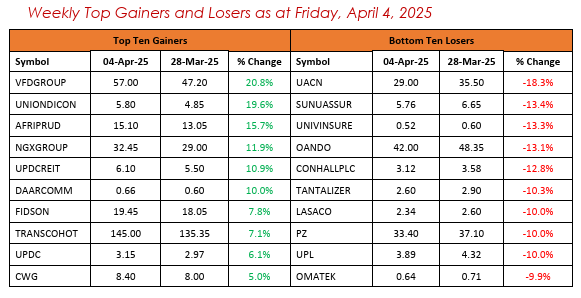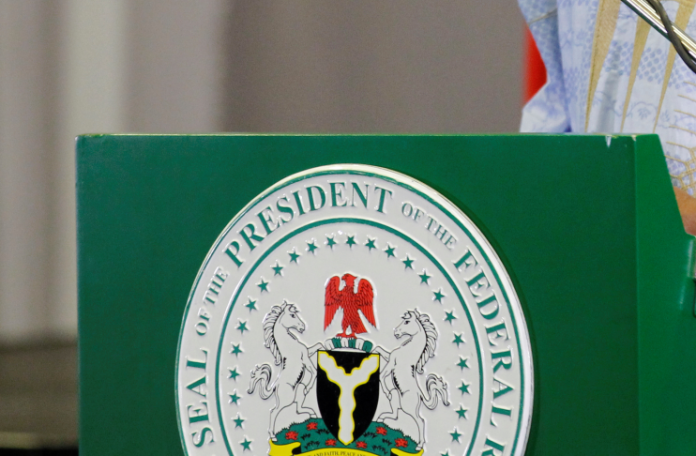Global economic trends in the first week of April 2025 were shaped by trade disputes, monetary policy expectations, and fluctuating commodity prices. In Nigeria, economic watchers tracked inflation data, debt obligations, and foreign exchange pressures. This report offers an overview of both international developments and key indicators within Nigeria’s financial system.
Global markets were affected by tensions surrounding a potential tariff war between the United States and China. The U.S. government has been considering imposing additional tariffs on certain Chinese goods, triggering retaliatory threats from Beijing. These actions, if implemented, could disrupt global supply chains and trade volumes, particularly in manufacturing and consumer electronics sectors.
In Europe, the European Central Bank (ECB) left interest rates unchanged as expected. However, market participants paid close attention to President Christine Lagarde’s remarks about inflation staying above target in the near term. She hinted at possible tightening measures if inflation remains sticky, especially in Germany and France, where consumer prices are still on the rise.
China’s economy continued to show signs of a bumpy recovery. While manufacturing indices showed some improvement, consumer demand remains tepid. The People’s Bank of China maintained its accommodative stance, signaling further support to boost domestic consumption.
Crude oil prices saw slight volatility, driven by uncertainty in the Middle East and mixed global demand signals. Brent crude hovered around $88 per barrel, supported by OPEC+ production cuts but tempered by sluggish industrial activity in Asia.
Nigerian Economy
Domestically, Nigeria’s economic space was shaped by inflationary concerns, debt servicing pressures, and ongoing foreign exchange volatility. Data released by the National Bureau of Statistics (NBS) indicated a continued rise in food prices, especially in urban areas. Analysts warn that headline inflation may exceed 33% in April if food and transport costs continue on their current trajectory.
Meanwhile, the Federal Government is set to service a significant portion of its external debt in Q2 2025. This could put more strain on foreign reserves. In March, Nigeria’s foreign reserves fell to $32.5 billion from $34.2 billion in February. It was largely due to debt repayments and lower oil exports.
The Central Bank of Nigeria (CBN) has continued its effort to stabilize the naira through interventions in the foreign exchange market. However, the naira still weakened slightly on the official market, closing the week at ₦1,420/$1, while rates on the parallel market approached ₦1,460/$1. This divergence continues to fuel arbitrage and underlines the demand-supply imbalance in the forex space.
Stock Market Update
The Nigerian stock market had a bullish week, reflecting investor optimism following positive corporate earnings announcements. The NGX All Share Index (ASI) rose by 1.72% to close at 104,300.15 points. Year-to-date, the market has returned over 39%, driven by strong performances in the banking, consumer goods, and oil and gas sectors.

Notably, Zenith Bank, GTCO, and Dangote Cement saw increased trading activity, buoyed by dividend declarations and stable earnings. Market capitalization increased by ₦983 billion, closing the week at ₦59.05 trillion.
Market analysts believe the ongoing rally is supported by attractive valuations and increased local institutional participation. This is especially true with pension funds re-allocating more to equities amid falling bond yields.
Money Market Update
Liquidity in the Nigerian money market remained tight for most of the week due to CRR (Cash Reserve Ratio) debits and FX interventions by the CBN. As a result, interbank rates trended higher. The Open Buy Back (OBB) and Overnight (OVN) rates closed at 24.50% and 25.75% respectively, compared to 19.00% and 20.50% the previous week.
The tight liquidity environment was also influenced by FGN bond auction settlements and statutory deductions from commercial banks. Analysts expect some relief in the coming week as FAAC (Federation Account Allocation Committee) disbursements are anticipated to inject fresh funds into the system.
Fixed Income Update
In the fixed income space, bearish sentiments dominated as investors reacted to higher stop rates at the most recent bond auction. The Debt Management Office (DMO) offered ₦360 billion across the 2031, 2038, and 2053 maturities and recorded a total subscription of ₦580 billion, highlighting strong investor interest despite rising yields.
Yields on benchmark FGN bonds rose slightly across most maturities. The 10-year bond traded at 18.45% compared to 17.95% the week prior. This reflects rising inflation expectations and investor demand for premium returns.
In the NTB (Nigerian Treasury Bills) market, secondary market trading was largely muted. However, rates remained elevated, with the 1-year bill closing at around 21.40%.
Investors are closely watching upcoming inflation data and the next Monetary Policy Committee (MPC) meeting for direction on future interest rate movements.
Forecast and Conclusion
Looking ahead, analysts expect cautious optimism across financial markets. On the global front, developments in U.S.-China trade tensions and monetary policy direction from major central banks will remain critical. Oil prices are also likely to respond to geopolitical shifts in the Middle East and energy demand signals from China.
For Nigeria, inflation and currency volatility remain the top risks to economic stability. The CBN is expected to maintain a hawkish stance to rein in inflation, although this may come at the cost of growth in credit and investments.
On the fiscal side, efforts to grow non-oil revenue and reduce dependency on external borrowings will be critical for long-term sustainability. Market watchers are also keeping an eye on potential reforms in the power and transport sectors. These sectors could unlock new investment flows.
In conclusion, April 2025 began with a blend of external pressures and internal challenges for Nigeria’s economy. While the equities market has provided some cheer for investors, broader economic fundamentals suggest the need for continued vigilance and adaptive policymaking.
Like 👍, Comment, share this article, and Follow us on our social media handles.







